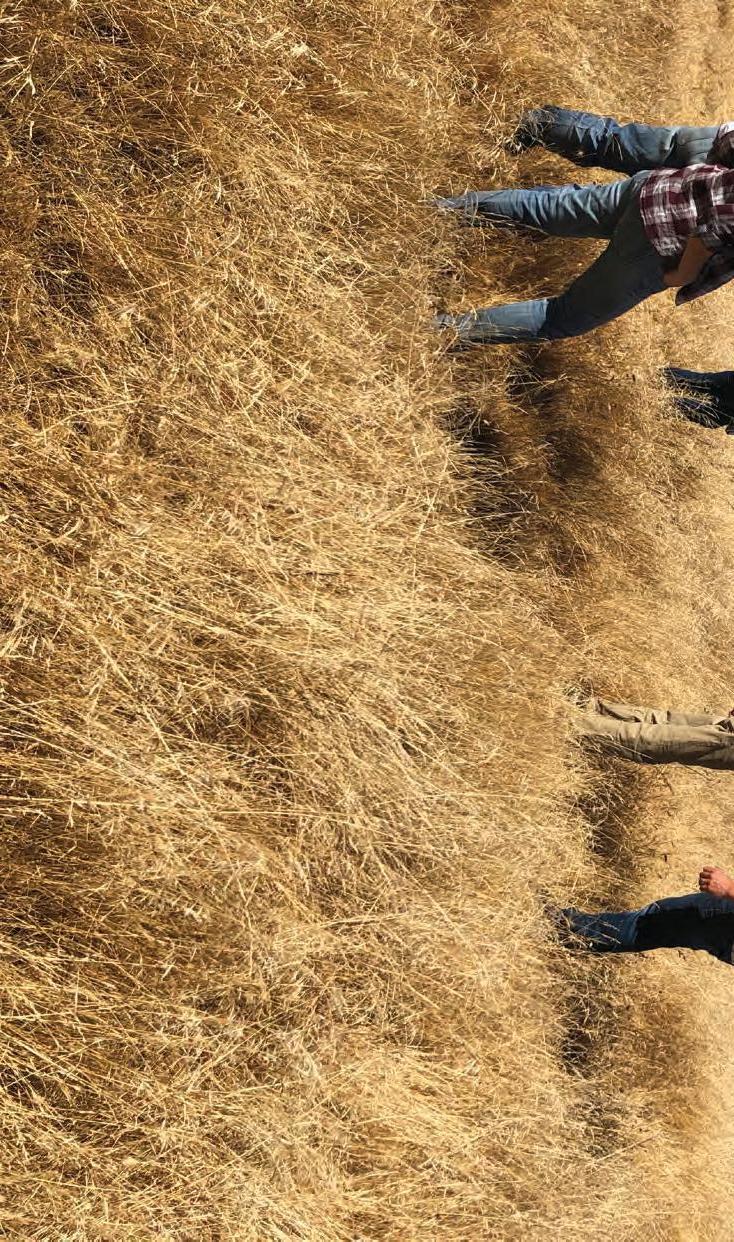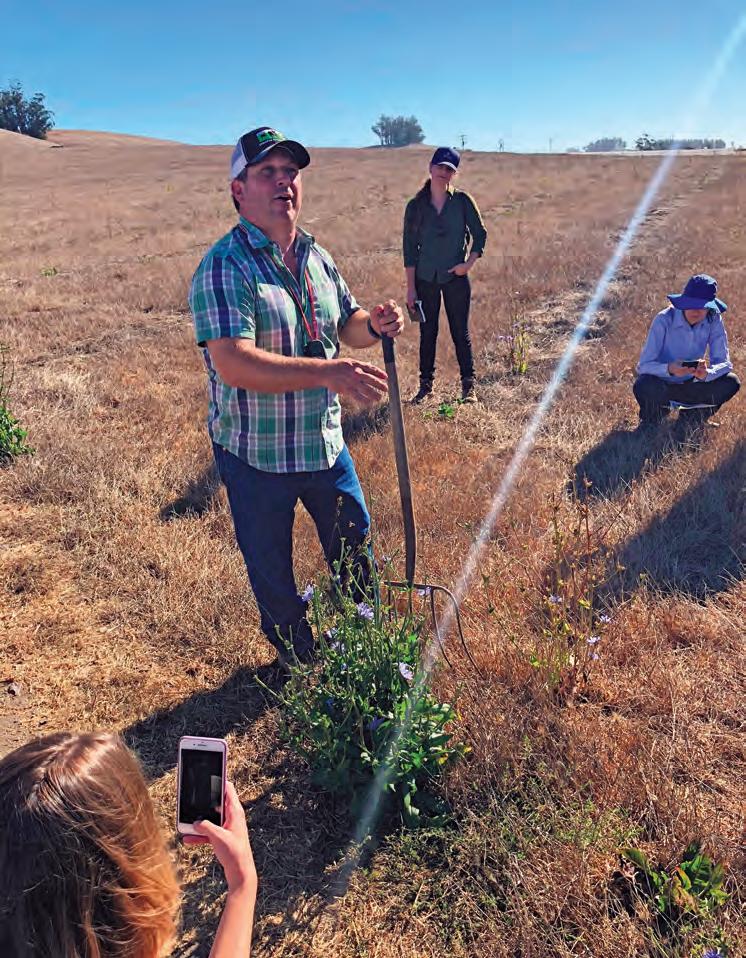
5 minute read
COLLABORATIVE RESILIENCE at the Foundation for Food and Agriculture Research by LaKisha Odom

California NRCS Sustainable Rangelands Roundtable soil health tour at Stemple Creek Ranch.
Advertisement

Collaborative Resilience at the Foundation for Food and Agriculture Research Story and photos by LaKisha Odom
In September of 2016, I joined a new organization dedicated to fostering innovative partnerships to fund audacious agricultural research: The Foundation for Food and Agriculture Research (FFAR). With a background in plant and soil science, years of research practice, and after previously holding positions at the EPA and USDA, I was excited to bring my experience to FFAR as the scientific program director of soil health. In this role, I have had the privilege of watching our organization grow and developing the Soil Health Challenge Area, a grant-making initiative that explores the linkages between soil health and farm productivity, economics, human health, and management practices. To date, FFAR has invested more than 30 million dollars in soil health research, with many more projects on the horizon. As a scientific program director at FFAR, one of my main goals is to determine research gaps and other spaces where our organization should focus its investigative efforts. One of the areas that has become more prominent throughout our organization over the years is resilience.
Scientists predict a changing climate will be harmful to farmers, who will soon face higher temperatures and more dry dates each year, both of which negatively affect crop yields. Additional changes in climate are expected over the coming decades — instances of extreme precipitation, increases in greenhouse gases, weed growth, the spread of new pests and pathogens — making it essential that farmers and ranchers respond and adapt more effectively to these emerging challenges. FFAR recognizes these impending difficulties, and has made it our mission to support innovative and collaborative science that provides every person access to affordable, nutritious food grown on thriving farms. As farmers and ranchers contend with the uncertainty and variability of our environment and food system, resilience and adaptive management strategies have become key components of our funding plan. FFAR recognizes that agricultural producers have always, throughout the course of time, been forced to adjust to new conditions, but the present moment requires us to offer even greater support. In collaboration with our extensive network of partners, FFAR has already funded important new research that can help build more sustainable and climate-resilient farming-production practices. FFAR acknowledges and respects the commitment that farmers, ranchers, and others have also made on their own in developing their sustainable food systems. By supporting the study and dissemination of practical, site-specific research, we help enhance farmers’ and ranchers’ climate resilience and productivity. 24
FFAR’s Current and Future Activities
Time and time again these past few months, as COVID-19 has run rife around the globe, I’ve found myself thinking about an old African proverb that I have slightly adjusted for our use at FFAR: “If you want to go fast, go alone, but if you want to go FFAR … go together.” In these uncertain times, when there are so many challenges that feel insurmountable, one of the things I am most proud of in my role at FFAR is the connection and collaboration that I foster between stakeholders and the projects we fund.
The following are just a small sample of the many FFAR projects that demonstrate these connections, as well as the increased potential that results from collaboration.
OpenTEAM
The Open Technology Ecosystem Agriculture Management (OpenTEAM) project is developing a farmer- and rancherdriven, interoperable platform to provide the best possible information exchange in support of soil health. The project currently has more than 20 members working together to share adaptive soil management advice (for example, which practices can help sequester carbon or promote proper aeration) with farms of all scales, in all types of geographies, using a variety of production systems. During The Packer’s Global Organic Produce Expo in January of this year, Dr. Dorn Cox, the Director of our OpenTEAM project and a scientist and farmer, stated:
We really see agricultural science as a shared endeavor and agriculture as a shared human project. And so we’re creating an environment where we’re linking producers and researchers and the general public together to help understand this larger world. Our commitment to spreading useful information is just one of the foundational tenets of this project and further illustrates the need for collaboration to achieve resilience. Several of our other projects have demonstrated exactly this sort of connectivity, with team members working closely and sharing the information they’ve learned in their own funded research. The next project described benefits directly from the work funded in the OpenTEAM endeavor. Loren Poncia of Stemple Creek Ranch talks about soil health.
Ecosystem Services Market Research Consortium
The Ecosystem Services Market Consortium’s (ESMC) mission is to improve soil health systems through the creation of ecosystem service markets. Ecosystem services are all of the additional services, such as cleaner water and healthier soil, that provide benefits to everyone. In an ecosystem market, farmers and ranchers can be rewarded in cash or credit for their good land stewardship. Our funded ESMC research incentivizes farmers and ranchers to voluntarily adopt crop and livestock production systems that increase their soil carbon sequestration and retention, reduce their greenhouse gas emissions, improve their water quality, conserve their water use, and benefit many other additional 25 ecosystem service outcomes — thus earning them credits in a national ecosystem services market where other buyers purchase similar credits to offset their own environmental and supply chain impacts. One of ESMC’s foundational principles states that America’s farmers and ranchers are crucial to finding solutions to address our nation’s soil health, identifying management practices that allow agriculture to reduce negative effects of climate change, and meeting natural resource and ecosystem services challenges. The project director Debbie Reed has stated:

There is no subject about which I am more passionate than working with farmers and ranchers to properly steward our natural environment. I’m thrilled to lead the









